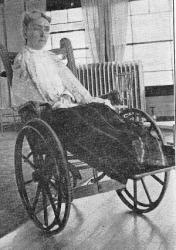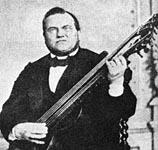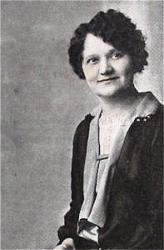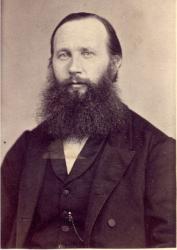
1866 - 1932 Author of "I Look Not Back" in The Covenant Hymnal Born: December 24, 1866, Vineland, New Jersey.
Died: September 8, 1932, Clifton Springs, New York.
Buried: Clifton Springs, New York.
The biographical account of poetess/hymn-writer Annie Johnson Flint (1866-1932) is a story of both heartbreak and triumph. Born on Christmas Eve in the small town of Vineland, New Jersey, she was welcomed by Eldon and Jean Johnson as their greatest earthly gift. Three years later, little Annie would lose her mother, who died as she gave birth to Annie’s baby sister. Mr. Johnson, who himself was suffering from an incurable disease, willed the children to the Flint family who would bring them up in the Baptist faith.
It was during a revival meeting at the age of 8 that the Spirit of God brought Annie's young heart to faith in Christ. She always believed that at that time, she was truly converted. Though she did not join the church until 10 years later, she never doubted that “the eternal work was then wrought.” She strongly opposed the idea that young children cannot comprehend spiritual truths. She felt that divine mysteries were often plainer to the simple faith of a child than to many adults, blinded by their own prejudices and intellectual doubts.
Whether by nature or through her early Christian experience, Annie was generally disposed to be cheerful and optimistic. She looked on the bright side of life and was able to get much enjoyment out of life. Her forward-looking, lifted-up head was a characteristic attitude and was typical of the courage she was to manifest in later life. She certainly learned to “endure hardness as a good soldier of Jesus Christ.”
After high school, she spent one year in teacher training and had a position offered to her, but felt that she was really needed at home. Later in her second year of teaching, arthritis began to show itself. She grew steadily worse until it became difficult for her to walk at all, and she was soon obliged to give up her work, followed by three years of increasing helplessness. The death of both of her adoptive parents within a few months of each other left Annie and her sister alone again. There was little money in the bank, and the twice-orphaned children had come to a real “Red Sea place” in their lives.
Her verses provided a solace for her in the long hours of suffering. Then she began making hand-lettered cards and gift books, and decorating some of her own verses. Testimonies came from many directions of blessing received, so two card publishers printed some of her greetings and released the first little brochure of her poems. The publication of her booklets and the action of the Sunday School Times linked her up with a worldwide fellowship, and she carried most of the correspondence, though one wonders how she could get a pen through those poor twisted fingers. Her letters were as rich as her poems, always bringing a touch of humor that was refreshing. She loved to give to others, but was reluctant to receive, even though she suffered great times of trial and testing. Eventually she gained new understanding and learned how to share the hard moments of her life with others who could not understand the hardships of their lives. She put into poetry words that she titled, “What God Hath Promised.” And through those words and many others, she became convinced that God intended to glorify Himself through her in her weak, earthen vessel; and like Paul, she gained real assurance and could say with the apostle, the promise granted to him: “My grace is sufficient for thee: for my strength is made perfect in weakness.” She could also say with Paul, “Most gladly therefore will I rather glory in my infirmities that the power of Christ may rest upon me.” She believed that God had laid her aside for a purpose, even though that purpose was obscure to her at times.
The marvelous thing is that Annie’s faith never faltered, and that she was at all times able to say, “Thy will be done.”
--www.homecomingmagazine.com/ (excerpts)
Annie Johnson Flint



